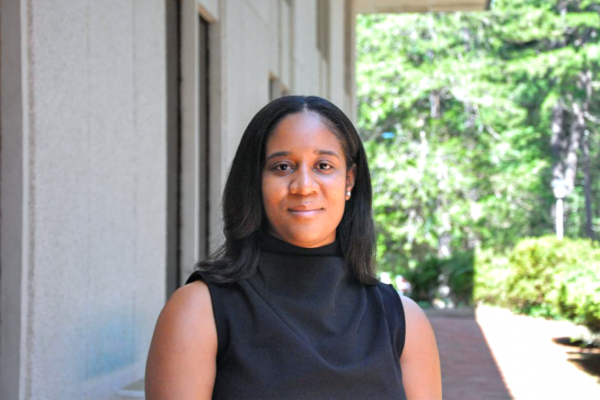
FPG Profile: Torica Exume
Torica Exume, PhD, is a research scientist at the UNC Frank Porter Graham Child Development Institute (FPG). With a strong commitment to improving the lives of autistic children, Exume applies her extensive education and hands-on experience to enhance communication, social interactions, analysis and treatment of repetitive behavior disorders, and safety skills.
As part of our FPG profile series, we recently spoke with Exume to learn more about her work at FPG. Here’s what she had to say.
Tell us about your professional journey and what brought you to FPG.
My professional journey is more common than it might seem. I began as an intern, gradually moved into a graduate research assistant role, and gained hands-on experience in laboratory settings and intermediate care facilities. Over time, I had the opportunity to work under the guidance of executive directors and CEOs, contributing to collaborative research and service initiatives. It was a fairly traditional path—until I realized there was even greater potential for growth and impact through my work at FPG. That realization has been a turning point, opening new possibilities for advancing my career and deepening my contribution to the field.
My research journey is grounded in a deep commitment to equity and a passion for improving the lives of children with autism and developmental disabilities, especially those who are too often overlooked in systems of care.
Early in my career, I partnered with schools, families, and community organizations to explore how race, disability, and mental health intersect. This work led me to investigate how structural barriers and implicit bias contribute to misdiagnoses, delayed services, and chronically under-resourced supports.
Today, my ongoing research efforts explore the intersection of early communication, behavior, and social development in autistic children. I'm particularly interested in how parent–child interactions can be leveraged to support early learning and developmental growth. Through interdisciplinary collaborations integrating psychology, education, and developmental science, I aim to deepen our understanding of the diverse cognitive, behavioral, and social profiles of individuals on the spectrum.
My journey is still just getting started! I’m drawn to FPG because of its groundbreaking research in autism spectrum disorder (ASD) and its commitment to improving outcomes for individuals with developmental disabilities. The opportunity to collaborate with leading experts, contribute to meaningful research, and make a lasting impact in the field excites me the most about joining FPG.
What do you do at FPG?
I play a vital role in advancing research, policy, and practice in child development, education, and disabilities. My work focuses on initiating and collaborating on independent and collaborative studies in areas such as ASD, early childhood development, and special education, using mixed methods approaches, and securing external funding from agencies. I also assist with publication writing, disseminating information at conferences, and leading research projects alongside interdisciplinary teams of researchers, policymakers, and practitioners.
What do you like most about your job?
I enjoy the collaborative research environment, our focus on evidence-based practices, and the ability to contribute to meaningful advancements in autism spectrum disorder and developmental disabilities. Working alongside experts, engaging in impactful research, and seeing that work translated into real-world applications keeps me motivated. I also value community engagement and knowledge dissemination, so connecting with professionals, educators, and families would make the work even more fulfilling.
What do you find most challenging?
One of the most challenging aspects of my work is navigating the gap between research and real-world practice. It can be difficult to see families struggling with barriers we already have the evidence and tools to address. Yet, structural issues like policy limitations, funding constraints, and workforce shortages persist. It’s also challenging to conduct equity-driven research in spaces not designed with inclusion in mind. Ensuring that historically marginalized families' voices are heard and centered takes time, trust, and a constant commitment to reflection and accountability. At the same time, these challenges are what motivate me. They push me to ask better questions, build stronger partnerships, and stay focused on the long-term goal—creating systems that truly support all children and families.
How does your work further the mission of FPG?
Through interdisciplinary collaboration, family partnerships, and community-engaged research, I strive to generate findings that are not only scientifically rigorous but also actionable and inclusive. In doing so, I contribute to FPG's commitment to evidence-based practices that support healthy development, learning, and social integration for all children.
What do you hope to have accomplished five years from now?
By then, I hope to have published several peer-reviewed articles, continue presenting my work at national conferences, and secured funding to support longitudinal studies on early communication development and parent–child interactions.
Is there anything else you want people to know?
Let’s keep it going with teamwork. Teamwork and collaboration are essential to creating impactful, sustainable change, especially in complex fields like autism research and early intervention. When diverse voices and expertise come together, we generate more innovative ideas and develop rigorous and responsive solutions to real-world needs.
